| An Interview With Andrew Poppy | |
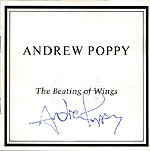 |
As a teenager Andrew Poppy experimented with musique concrete, played Beethoven on the piano and bass guitar in an improvising rock band before going on to study music at Goldsmith's College. During his time at Goldsmiths he was active as a performer organising performances of Terry Riley's In C and other experimental works, as well as playing the piano in Webern's Concerto and giving a solo piano performance of Glass's Music in Fifths. His interest in an alternative contemporary music was especially stimulated by contact with American composers Christian Wolff and John Cage. On graduating in 1979 Poppy worked as an accompanist at The Laban Centre of Dance and Movement giving him an education into the world of contemporary dance. In early 1981 Poppy became a founder member and pianist with The Lost Jockey, a large ensemble which explored in both composition and performance the pulse based techniques associated with the work of Glass, Reich and Andriessen. He wrote a number of works for the ensemble including, The Object is a Hungry Wolf. Poppy's attempt to recontextalise this music and gain access to a wider audience came in the mid 1980's when he signed as a recording artist to Paul Morley and Trevor Horn's ZTT Records. Enthusiastically pursuing a post minimal aesthetic in the context of a pop label he recorded 2 CDs. The first, The Beating of Wings contains 3 fully notated works (including 32 Frames for Orchestra) and Listening In, a type of studio work further developed in his second CD Alphabed. This album clearly merges traditional composition and studio production techniques in its use of sequencers, samples and electronic keyboards and includes a variety of singers including Annette Peacock, Ashley Slater, Udo Scheuerpflug and Dee Lewis. Two 12-inch releases show the extent to which Poppy could use the studio to build new works out of the multi-track recordings of finished pieces. The Impossible Net remodels 32 Frames whilst Kink Konk Presto, Kink Konk Adagio, East Fragment re invents Listening In. During the 1980 Poppy collaborated on experimental/visual theatre pieces produced by The Institute of Contemporary Art in London such as Secret Gardens and Midday Sun. This interest developed into a number of music theatre or chamber opera works: The Songs of the Claypeople for Impact Theatre and The Uranium Miners Radio Orchestra Play Scene's From Salome's Revenge for Royal Opera House's Garden Venture. In 1991 The National Theatre Studio commissioned Baby Doll a chamber opera for 3 voices, adapted from a Tennessee Williams' screen play and in 1996 the composer wrote and recorded Ophelia/Ophelia an opera and version of Hamlet for one voice which was selected by the International Society for Contemporary Music to be part of the year of culture festival in Copenhagen. In the 1990s a renewed interest in concert music produced 14 Poems and Toccatas for violin and piano, (performed at the Huddersfield Festival by Andrew Ball and Elizabeth Perry) and Ember: String Quartet for The Balanescu Quartet. Eight Movements for Piano Trio, Eleven Word Title, Sprung and Suspended and End Synch Sound (with a film) were commissioned by various chamber ensembles. In 1997 the Royal Liverpool Philharmonic Orchestra commissioned Horn Horn a concerto for 2 alto saxophones and orchestra. Most recently New York pianist Jed Distler and UK based Tania Chen have performed selections from Fruits and Shavings, 23 pieces for solo piano. Over the last two decades Poppy has contributed to the creative projects of many other artists. This includes working in the studio with bands such as The The, Erasure, Nitzer Ebb as well as making theatre scores for Julia Bardsley's productions of Macbeth and Family Reunion and Kenneth Branagh's perfomance of Coriolanious. The list of choreographies provoked to make dances to Poppy's music include Ian Spink, Sally Owen, Michael Clark, Gaby Agis, Sue Davies, Linda Gaudreau, Julia Bardsley, Michael Popper, David Massingham and most recently New Yorker Heidi Latsky. He has also made music for TV and film – notably with Portugese director and producer Vitor Gonçalves – and between 1995-97 he was head of music at the National Film and TV School in the UK. The year 2000 SAW the CD release of Time At Rest Devouring It's Secret, a studio work of 35 minutes duration which once again connects the musical techniques of the minimalist project to an image from popular culture. • |
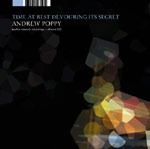 |
Rupert Loydell: Your new CD, Time At Rest Devouring Its Secret, seems to have be very much of the moment, in that it shows affinities to both the quiet -sounding and -paced music of Morton Feldman and Takemitsu, and to early electronic music. These musics are very fashionable at the moment: there’s been a flurry of releases and re-releases by the former, and compilations like Ohm: the early gururs of electronic music and Early Modulations anthologising the latter. Is this just fortuitous or are you very aware of trends and movements in contemporary music? I ask this partly because at the time of your first album, The Beating of Wings, there were groups like Lost Jockey and Regular Music drawing on the then fashionable hybrid of minimalism and rock dynamics. Andrew Poppy : I hope to keep aware of what is going on and I think I’ve done my own share of moving things along, changing things. I’ve always been interested in electronic music and the recording process since I was at school in the 60s when I discovered Stockhausen’s ‘Kurtzwellen’ and Pierre Henry’s ‘The Door and the Sigh’ piece. They were inspirational along with all the psychedelic multi-track stuff that the Beatles did in the studio. Tape as a material and process was an extraordinary inspiration then and still is even now. I still work with analogue sometimes. Seeing what happens when you turn the tape over is always a revelation, a transformation! How much I’m a fashion victim is something for you have to decide. The basic material and the idea of the process of ‘Time at Rest’ was made around 1989 and I kept coming back to the work during the 1990s trying to find a way to make the piece. To find out what it might be about. It didn’t really come into focus until late 1999. Perhaps it was that during the 90s I tried to re-engage with traditional performance with musicians again; to get away from the multi-track studio and the computer and make shorter piece. But recently I’m trying to integrate some of those ways of working having now made quite alot of notated concert music. For instance there is a notated version of ‘Time at Rest’ that works with the recording. I was in both Regular Music and Lost Jockey at their beginning. I was particularly responsible, for what it is worth, for trying to position Lost Jockey in a more popular cultural context. The dusty musty academic world of new music concerts and competitions always really depressed me. It’s like some old boys club. So I approached Melody Maker and John Gill at Time Out to do features about the Jockey. I pointed to the connections between Terry Riley and Kraftwerk in what we did. Both of whom at the time (1981) had some currency outside the academic music context. At the time Glass and Reich were still very esoteric. Where as Riley had the psychedelic ‘hit’ of sorts with ‘A Rainbow in Curved Air’ in 1971. My idea was not that we were doing pop music but that the music we were making could have a real audience. Not just one of music students. After I left Lost Jockey I continued to approach adventurous record labels with tapes rather than seek out a publisher with scores, which is the traditional route for a composer. |
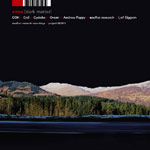 |
I think I'm right in saying ‘Time At Rest’ is very much a studio composition? You talk in the statement you sent me about the work in terms of duration, texture and performance. Can you elaborate this, perhaps sharing the process of composition [ie the intent and ideas behind the piece] as well as the process of making the music in the studio? I’m especially intrigued by your idea that ‘the part played by the mix is performance’. What I mean by performance is some thing dynamic, fluid, spontaneous and unique at a particular moment in time. Unconscious and not rationally motivated. Something lived in the moment as opposed to the constructed and conceptual work that might be called composition. It’s a difficult one because composition involves spontentaneity and the flow of unique moments as well. And of course some ways and traditions of making music don’t conceive of composition as a separate work. Western Classical music is very particular in the separation of composition and performance. Notation is central to this. But anyway with something like ‘Time at Rest’, because it is so systematic I feel the need to mess it up a little, to blur things or to make them breath in a different way. So as the mix proceeds you engage with the moment, in the emotional life of the piece, listening creatively to the movement of the piece and things start to happen that you didn’t hear before. Just the simple re-balance of stereo can bring some detail to the surface. This shapes the work in a different way from the imperatives of mechanical structuring. ‘Time at Rest’ started with a simple melody which was originally improvised then divested of all rhythmic detail by giving every pitch a equal duration and space. Turning it into pulse. This was then analysised in a simple statistical way. The tune generates a number of chromatic lines. The idea was that the repetition of pitch within the original melody was itself a rhythmic structure. All the repeated pitches then because the points to articulate a chromatic line. This isn’t important to know when listening but I think it is one of the things that holds it together. The process is just out of reach perceptually. This keeps the tension within what seems to be quite a static texture. I’ve always been interested in the way chromatic lines provide tension in a static environment. ‘32 Frames for Orchestra’ is a good example. Another aspect I’m interested in is what I think of as fictional space and real space. Fictional space as in artificial reverbs and the position of sounds in the stereo image. Left/right forward/back (wet/dry). To some extent all recordings are electronic music because they are recordings. They have gone the transformational way of recording technology and are projected via loud speakers. Somehow they become performance again in the real space of the playback. Every room being unique, every speaker position, every set of ears. So the fictional space (the reverbs and panning) interacts with the real space of playback with its positions and reverbs. So I’ve been presenting ‘Time at Rest’ in installation and performance modes and it seems to work very well. Especially in traditional performance venues. I first presented it in a studio theatre at the National Review of Live Art in February then in March at The Space in Isle of Dogs. and then for 14 continuous performances at the Tramway in Glasgow on 28 29 April |
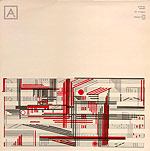 |
You've always had an interest in variations, haven't you? Several pieces on your two ZTT albums were remixed for 12-inch releases. Was this your decision or was it part of the 1980s remix culture. Obviously, Trevor Horn was instrumental in creating and sustaining this remix movement, although he never got his hands on your tapes did he? Would you consider someone else mixing your music? The way I work with variation isn’t always like the classical theme and variation. Although the inspiration for something like ‘32 Frames’ was late Beethoven variation form. The 14 ‘Poems And Toccatas’ on the Recordings CD are more like Schumann variations. Aspects of an environment, a world, like ‘Carnival’ or an unspoken theme. I suppose Re-mixes are variations in some way. Today remixing often becomes re-composition. I really liked the way that Trevor was pioneering the remix. The idea of making a completely new piece inside the body of an old one is not so new. Compositions manual from the 18th century suggest just that: write a new bass line for a old tune or visa versa. The 3rd movement of Berio’s ‘Sinfonia’ was a great inspiration for me as a student. He took a Mahler movement and then gradually substituted each moment with ‘samples’ from other orchestral works. Although the samples are completely written into the score and then played by the orchestra. It’s like a version of Cage’s collage techniques with radios but from the platform of high culture. A prophetic piece in some ways. I’ve heard that Luciano was bemused by ‘Sinfonia’’s success. And you can understand why. The way the technique of collage challenges the position and skill of the European composer. John Leckie told me that the Jamaica record industry used to thrive on the remodelling of tracks. Partly to reuse the expensive 2 inch multi-track, the backing tracks made by session players would be passed from one singer to another to make new tracks. The old vocal getting wiped out each time. There is another track on a compilation released by the same company who've released Time At Rest, yes? How do you feel about the company you keep there? Are you interested in electronica and experimental dance musics? What music informs your current preoccupations? Is that different from the music you listen to for relaxation or pleasure? ‘Blind Fold’ is for solo electric piano and released on souRce research recordings as part of Ian MacKinnon’s Emre: dark matter project. I like different contexts. Support is where you find it. Ian’s label has been a much needed injection of confidence. There’s not much support in the new music community for what I’ve been doing for 20 years. The SPMN trumpet that they are an open society promoting lots of types of music. The reality is something else I’m very interested in electronica and experimental dance music. But I listen to loads of different stuff. Any particular year I'm obsessing about something. Continuos faves of the last couple of years are the Mad Professor remix of Massive Attack No Protection. Radio Head. During the 90s Schnittke, Gubiadulina, Takamitsu, and Feldmann have dominated alot of my thought and I acknowledge their influence on my work. I have a problem trying to approach the ‘work and pleasure’ bit of your question. When I go out to a club I may dance to the most horrible things if they have the necessary groove and are played loud enough. That may or may not be a pleasure. In fact I’ve had some moments of musical epiphany on the dance floor to those funky house tracks. I played Schnittke’s ‘Concerto of Piano and String Orchestra’ to some students recently. I hadn’t heard it for 5 or 6 years and I was completely awe struck. Last year I did some work with Claudia Brucken (Propaganda). We met up again recently and did a set of covers for solo piano and voice. Just as a way of getting to know one another musically. We did a little low profile gig and we’re hoping to work together again soon |
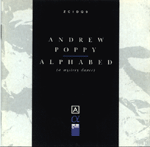 |
Alphabed remains one of my favourite albums. I found it second-hand shortly after a friend taped The Beating of Wings for me and suggested I’d enjoy it. [I did]. It seems to me to be different from your other releases in the way it slots into what, for want of a better phrases, I'd call ‘experimental rock songs’ – I’m thinking of work by Annette Peacock [who appears on the album], Robert Wyatt, perhaps Laurie Anderson. Is that fair? I wondered firstly, why you’d moved away from that area of music, and, secondly, whether ‘The Songs of the Clay People’ – which is noted as ‘a work in progress’ on the album sleeve – was ever completed. I’d love to hear further instalments. I’m really pleased you like Alphabed. For me it’s about two things. ‘45 is’ is like a homage to Robert Wilson and Philip Glass of the ‘Einstein on the Beach’ period. Although I didn’t make it in that spirit. It was part of a music theatre work called ‘Songs of the Claypeopl’ which itself came out of a collage poem that I wrote and then developed into a theatre piece with Impact Theatre. The second thing is the studio. More than any other album this is about being in the studio and working with technology. Although all the tracks were written in outline. Much of the detail of ‘Goodbye Mr G’ was developed in the studio. There is another 45 minutes of music from that show which hasn’t been successfully recorded. I moved away from this area of work because I didn’t have access to a studio after ‘ZTT the 80s version’ came to an end. I couldn’t get a deal to continue what I was doing. There was a ZTT backlash I think. Although Daniel Millar at Mute was interested ( I made several arrangements for Erasure and Nitzer Ebb) it never developed into a deal unfortunately. No deal, no studio, it’s hard to make records, especially if you’ve been used to working in great studios with engineers like Stuart Bruce, Bob Kraushar Dave Meagan. I was very disillusioned with attempting to position what I did in the popular arena. Too often dismissed by journalist who know nothing about the music. I still think Beating of Wings is a production with ambition and range unmatched by anything in that area at the time. Yet at the end of the 90s I had no support and no idea of how to continue. It was very easy to see how business can pick you up when you seem to have a lot to offer, try you out for a couple of year s and then drop you. I went back to the drawing board literally, to the pencil and paper and to the piano and got connected up to the compositional things that had been let slip in the studio. I wanted to make pieces that would work directly with straight forward performance. So just a piano and a violin or a string quartet. No electronic technology. Nothing to plug in. Just the musician and the instrument. Was the live performance of the Alphabed music in Paris as exciting as it looks on the album sleeve? The feedback I got was very positive. Picture and review in the Blitz at the time. The opening of the Science and Technology Park at La Villette was on News at 10 and Gary Maughen, one of the fairlight programmers, told me you could hear a snatch of ‘45 is what your score is’. It's good to be witnessed. The French President enjoyed it! Dare I ask what actually happened when ZTT closed? They seemed to have everything going for them and then it all imploded until their recent resurrection! I don't really know myself exactly what happened to ZTT. When I signed Trevor reassured me that they were committed to a 5 album deal and to me being able to develop as an artist there. It’s true I did learn an enormous amount. They let me produce my own records. The only artist on ZTT to do so. Being close to what Trevor and Steve Lipson were doing was fantastic. They showed me how they were working on the Grace Jones project with 2 digital machines. I looked though the ‘Two Tribes’ multi-track with Stuart Bruce. So elegantly put together as a production. Like a Brian Wilson thing. And the Art of Noise were around. Gary Langan and Ann Dudley. I was a big AON fan. That's why I'd gone to ZTT in the first place. I just wanted to make records really. Towards the end when I was hanging around all the time waiting for studio down time to finish Alphabed Jill (MD at ZTT) said she’d get me some production work. I really wanted to work with Billy Mackenzie. I felt he never got the arranger/producer he deserved. But nothing every happen. The whole ZTT label seemed to evaporated sometime in 1987. They had legal problems with Island Records who they were obligated to for manufacture and distribution. There was some nest fouling going on I think. There was the Dave (Stiff) Robinson factor. He came in as label manager for a while. Don’t understand that one. Don’t think Robbo and Paul Morley were on the same planet aesthetically and at a conceptual level Paul Morley was fundamentally important to spirit and identity of ZTT. There’s a lot to inverted snobbery in popular culture in the UK at least. The anti intellectual British bull dog mentality rules OK. All this coincided with Frankie and Propaganda and AON going the way of all things: litigation. It was all a bit of a mess at the end. Although I didn’t leave on bad terms. My contract lapsed. |
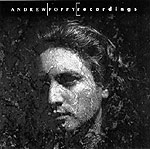
|
You haven’t been tempted to rejoin their artists’ roster I presume? – although they’ve re-released your two albums. My two albums were released by ZTT/Warners during the 90s when ZTT were licensed to them. Since that changed, ZTT are now with Universal, my ZTT records are unavailable. I'd love to do something with the label again but perhaps they don't have the optimism and adventurous spirit of the 1980s. I met Paul Morley at a party last year and he said if he'd been running ZTT I’d be on my 17th album by now. So… The thing is, I learned that there are more ways to hatch a chicken. I mean my early ambition and drive was to be a musician/composer and make records. I'd made records under my own name so even though I felt insecure and alone at the end of the 80s I had achieved something. Although it’s curious. I wasn’t really aware that people had bought the records all over the world and were really into the music. It took 10 years for that to filter back. The internet has been great. When I started my own production company I’d started to get feed back. From all over: USA, Europe, Russia So after ZTT about 1988 I re-focused. Put making records as a low priority. People like Graham Fitkin and Lawrence Crane have been very supportive. When Graham was composer in residence at Liverpool Philharmonic he and Duncan Fraser commissioned ‘Horn Horn’ – the piece for 2 solo saxophones and orchestra. Having the chance to write for full orchestra again was a high point of the 90s. Since then it seems your own work – from where I stand anyway! – has mainly been in the classical world, although I’m aware you have written for theatre and dance, made music for TV and film, and worked in the studio with several rock bands. Am I right in imagining a small world of contemporary classical listeners and record labels in the same way there is an ‘indie-rock’ and ‘electronics’ scene, or do you feel part of something more general and wider? Can you talk about the function of your own Bitter & Twisted Records & Productions company within the marketplace, and its role in furthering and nurturing your music? Do you record your work and then try and place it with a record company, or do they commission recordings? The music is for anyone who wants to listen. I don’t feel particularly connected to any one thing. I wish I did sometimes. Bitter and Twisted Records and Production was set up as an umbrella for recording and live projects. Originally I wanted to have a label and release music by other composers but it's hard to finance. The Recordings CD was my own money and released on my label Bitter and Twisted. Again a great learning process: understanding the complete label process, especially at the promotion and distribution level. Yes I’m part of something wider than the classical music ghetto. But I’m part of that tradition in the way that I organise my musical resource rather than being in the club. As Glyn Perrin once said you can’t throw 2000 years of notation out of the window overnight. Perhaps he meant that it has to be modified and dismantled, re model, bit by bit even if you have played in a rock band. The last few releases have been BTRAP productions licensed to different labels and recently working with Ian Mackinnon at souRce research recording has been a wonderful development. Obviously I’ve worked in music production since Lost Jockey and before. All my recordings are produced by me. I feel that the music production is part of the composition. I’m very grateful to all the labels that have released my work. I realise that it is an act of faith on their part. It’s very hard to do the whole process oneself with very limited financial resources. How do you see the music business in a few years time? It seems it has to deal with MP3 and the net, fragmentation and smaller, more genre-specific, sales and copyright issues on top of all that. Robert Fripp [and he isn’t alone] has made a stand against record companies taking copyright away from composers and musicians. Do you think we will see moves – though maybe not in Top-of-the-Pops land – towards musicians retaining more control of their musical output, licensing their music to record companies as and when required? Fripp and King Crimson, for instance, seem to have various levels of release: official bootlegs released by subscription, more generally available releases on their own label, and mainstream releases licensed to a major record company for international releases. It’s a catch 22. Business will not invest in promotion unless it see the potential for return. Challenging work is always going to be ‘perceived to be’ a high risk. I believe that unchallenging work is also a high risk commercially because no one really knows what will be a hit tomorrow. But this idea doesn't worry the accountant. What is important is that the accountant ‘believes’ that challenging work is a high risk. So we’re stuffed. It’s not possible to record or perform something like ‘32 Frames’ without large scale subsidy or the support of a commercial enterprise. I don’t have access to either. With hard work and determination it's easy to do small scale things all yourself. Is it possible to promote properly without a budget? The new story is that the internet works like a super word of mouth. That it is possible to disseminate work without any promotional budget at all. I’m not sure that a few exceptions become a rule. Many of your works seem to have a quite literary source, or ar least component. The lyrics on Alphabed are certainly more ‘poetic’ than normal lyrics, and Ophelia/Ophelia draws on Shakespeare’s Hamlet. Do you come at music – or this music – through language rather than initially hearing it? There is a whole aspect to what I do that is about finding the other side of language. What is behind the mirror of language. The way text shapes things is hard to say. In a song, perhaps it is clear. But in Ophelia/Ophelia for instance, the text is often scrambled by the abstract musical processes. I like this. Language is such a strong force. It’s great to find a way to pull it off centre. It’s that question of music and meaning. Ophelia says ’tis in my memory locked and you yourself shall keep the key of it’. The meaning seems clear. Why should we sing? Literature is important to me, especially poetry. And I’ve been re-reading Borges again How does this contract with the more chamber-type music on Recordings? This group of work seems more traditionally ‘classical’ than your other music. Is this deliberate, am I reading it wrong, or just a careful choice of work for a particular moment or release? The CD Recordings is more overtly classical and not just the compositions. It’s recorded straight to stereo. Recorded and edited like the Arditti might record. Live performances in a space. ‘Rude Bloom’ tries to make the point about different recording processes with two sets of trios. The piano trio was recorded straight to stereo (almost) the other is sequenced and overdubbed with keyboards, drum machine, trumpet and sax. Do you enjoy collaborations? How much freedom are you given when orchestrating for a rock band in the studio? Or when working on experimental theatre or performance pieces? Presumably scoring for film and theatre means you see the finished, or almost finished performance and work to that? Do you find that restrictive? How do you teach this way of making music? – you were head of music at the National Film & TV School in London for several years. Almost all the orchestration I’ve done for bands I’ve been given a free hand. So I’m a collaborator in a way and I really enjoy this challenge. I try to work on projects where I feel that people want what I have to offer. I love collaborating on hybrid forms that use music: theatre, dance, film… Although different artist are coming together to make a single work that single work is like a trick or convention of form. Dance and film and some types of theatre are hybrid and heterogeneous works. There is a book that I’m working on intermittently about this whole area of work and ideas. There are as many approaches as people and productions. Also there is always more than one solution to any particular screen moment. Running courses it’s fascinating to give 10 composers the same film and see the responses. Of course some people make things that are wildly inappropriate. There are always a couple of great takes on the scene. The obvious solutions are usually the ones that work least well. It's not that every solution is right but that there is more than one appropriate solution to the sonic experience of any screen moment. Some people look at the picture too much I think. The successful score is one that creates space between the image and the sounds The other thing is that the work isn’t finished until the end of the process. We are all making it up as we go along. Just because there is a script, or a rough cut, doesn't mean the solutions are a foregone conclusion in the director or producers head. The two sides to the Hitchcock myth are 1) that he saw everything in his head before principal photography. Great. Preparation is essential part of any process; 2) He told Hermann not to score the shower scene in Psycho. Herman ignored him because he had a different creative impulse. What do we have of the film today? Your website lists two new projects you are working on: a collaborative ‘environment with moments of performance’ and a new ensemble piece entitled ‘Weighing the measure or Why Pulse’. Can you tell me about these and any other new work? ‘Avalanche Thoughts’ is the title of a collaborative work that Julia Bardsley and I are developing for a large gallery space in New York called ‘Gale Gates et al’ in November 2001. The title comes from a set of piano pieces of the same name and the concept and material developed out of a short story by Ted Hughes into ‘Snow’, a short film by Julia. ‘Avalanche Thoughts’ incorporates installation, performance, video projection, live and recorded music. Perhaps it will be a kind of Happening where everyone experiences being lost in the snow, for an hour and a half. We are hoping to bring it to UK next year if we can find a venue and a promoter. ‘Weighing the Measure’ is a work in progress estimated duration about a hour. Hopefully it’s something to do with trance, dance and drone. It’s something that I’m developing with a group of musicians in Rome. At the moment it'‘ for drum machine patterns and ensemble but it's likely to change once the process gets under way. You can see my web site for updates and details: http://www.andrewpoppy.com
|